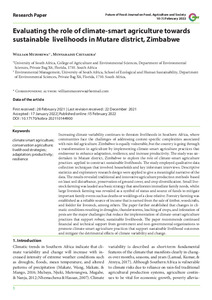| dc.date.accessioned | 2022-03-07T11:23:40Z | |
| dc.date.available | 2022-03-07T11:23:40Z | |
| dc.date.issued | 2022-02-15 | |
| dc.identifier | doi:10.17170/kobra-202110144900 | |
| dc.identifier.uri | http://hdl.handle.net/123456789/13670 | |
| dc.language.iso | eng | eng |
| dc.rights | Namensnennung 4.0 International | * |
| dc.rights.uri | http://creativecommons.org/licenses/by/4.0/ | * |
| dc.subject | climate smart agriculture | eng |
| dc.subject | conservation agriculture | eng |
| dc.subject | livelihood strategies | eng |
| dc.subject | productivity | eng |
| dc.subject | resilience | eng |
| dc.subject | adaptation | eng |
| dc.subject.ddc | 630 | |
| dc.title | Evaluating the role of climate smart agriculture towards sustainable livelihoods in Mutare district, Zimbabwe | eng |
| dc.type | Aufsatz | |
| dcterms.abstract | Increasing climate variability continues to threaten livelihoods in southern Africa where communities face the challenges of addressing context specific complexities associated with rain-fed agriculture. Zimbabwe is equally vulnerable but the country is going through a transformation in agriculture through the implementation of climate smart agriculture practices that endeavour to enhance adaptation, resilience and increase productivity. The study was undertaken in Mutare district, Zimbabwe with the aim of exploring the role of climate smart agriculture practices that are applied to construct sustainable livelihoods. The study employed a triangulation and validation of quantitative and qualitative data collection techniques that involved household surveys and key informant interviews. Descriptive statistics was applied to give a meaningful narrative of the data. The results revealed traditional and innovative agriculture production methods that are based on least soil disturbance, preservation of ground cover and crop diversification. Small livestock farming was lauded as basic strategy that ameliorate immediate family needs whilst large livestock farming was revealed as symbol of status and source of funds to mitigate important family events such as deaths or weddings of close relative. Forestry farming was established as a reliable source of income that is earned from the sale of timber, woodcrafts and fodder for livestock, among others. The paper further established that changes in climatic conditions that result in droughts, thunderstorms, leaching of crops and infestation of pests are the major challenges that reduce the implementation of climate smart agriculture practices that support robust sustainable livelihoods. The paper recommends continued financial and technical support from government and non-governmental organizations to promote climate smart agriculture practices that support sustainable livelihood outcomes and mitigate the detrimental effects of climate variability and change. | eng |
| dcterms.accessRights | open access | |
| dcterms.creator | Muzorewa, William | |
| dcterms.creator | Chitakira, Munyaradzi | |
| dc.subject.swd | Simbabwe | ger |
| dc.subject.swd | Landwirtschaft | ger |
| dc.subject.swd | Nachhaltigkeit | ger |
| dc.subject.swd | Klimaänderung | ger |
| dc.subject.swd | Konservierende Bodenbearbeitung | ger |
| dc.subject.swd | Lebensunterhalt | ger |
| dc.subject.swd | Produktivität | ger |
| dc.subject.swd | Anpassung | ger |
| dc.subject.swd | Resilienz | ger |
| dc.type.version | publishedVersion | |
| dcterms.source.identifier | eissn:2197-411X | |
| dcterms.source.issue | No. 1 | |
| dcterms.source.journal | Future of Food: Journal on Food, Agriculture & Society | eng |
| dcterms.source.volume | Vol. 10 | |
| kup.iskup | false | |
| dcterms.source.articlenumber | 412 | |


